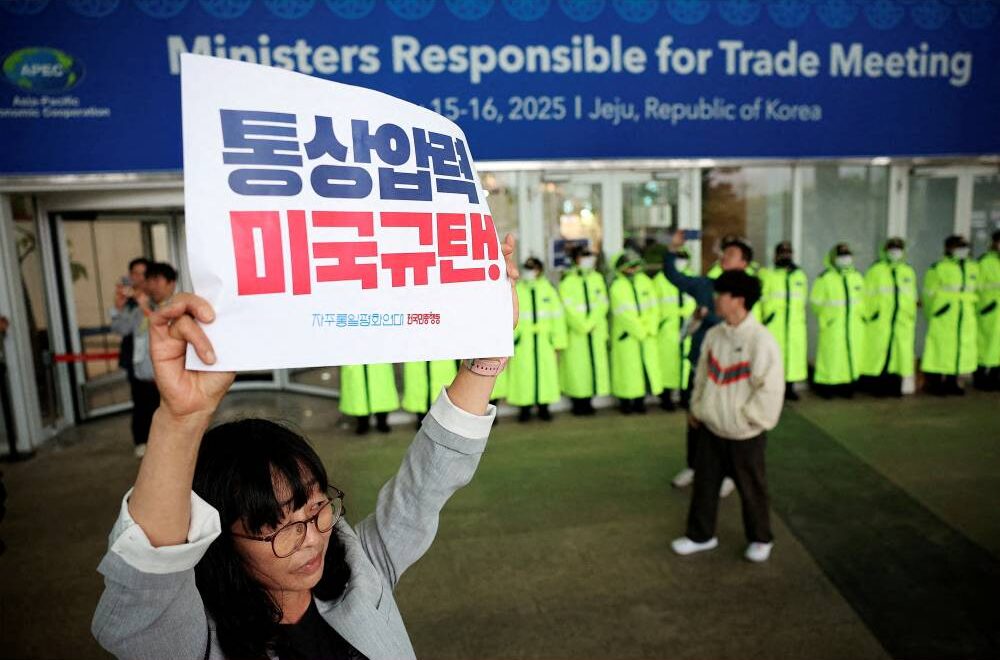Apec stresses ‘challenges’ as US tariffs overshadow regional meet

SEOGWIPO, SOUTH KOREA—The Asia-Pacific Economic Cooperation’s (Apec) trade gathering adopted a statement on Friday that cited “fundamental challenges” facing the global trading system, but stopped short of discussing a joint response to US tariffs overshadowing the meeting.
The annual meeting is the first major multilateral trade gathering since US President Donald Trump’s announcement of sweeping tariffs that hit more than half of the 21 members of the bloc with US import duties in excess of the 10 percent minimum.
“We are concerned with the fundamental challenges faced by the global trading system,” Apec members said in the joint statement.
They also said they remained committed to Apec as the main forum for regional economic cooperation and to address the economic challenges facing the Asia-Pacific region.
The statement expressed support for the continued role of the World Trade Organization (WTO), while noting its shortcomings.
“We recognize the importance of the WTO to advance trade issues, and acknowledge the agreed-upon rules in the WTO as an integral part of the global trading system.”
WTO challenges
The statement also said that “the WTO has challenges and needs meaningful, necessary, and comprehensive reform to improve all its functions, through innovative approaches, to be more relevant and responsive in light of today’s realities.”
The Trump administration views the WTO as a body that has enabled China to gain an unfair export advantage and has recently moved to pause US funding to the institution.
Kim Yong-jin, a management professor at Sogang University, said the joint statement reflected US claims “they are at a disadvantage under WTO, and that needs to be fixed.”
Apec warned at the start of the meeting that exports from a region that accounts for around half of world trade would slow sharply this year in the wake of the US tariffs.
Earlier on Friday, some top diplomats from member countries had expressed doubts the group would be able to adopt a joint statement, although they said South Korea minister for trade, Cheong In-kyo, had pushed hard for some consensus.
‘New momentum’
“There was new momentum created through these meetings to overcome a difficult situation … as Apec urged a trans-regional effort to break through uncertainties engulfing the global economy,” Cheong told a briefing.
The adoption of a joint statement follows the failure to reach a joint communique at a Group of 20 meeting of finance ministers and central bankers in Cape Town in February, after top officials from several countries, including the United States, skipped it.
Cheong said there was no “official” discussion on a joint response to US tariffs.
“But, from our standpoint, it is difficult to jointly respond because each country is in a completely different situation,” he said.
For many of the member economies, the attendance of US Trade Rep. Jamieson Greer raised the stakes of the conference held on South Korea’s Jeju Island, ahead of a leaders’ summit scheduled later in the year.
On the first day, many, if not all, of the representatives had or sought a meeting with Greer, according to host country officials.
Greer held talks with China’s vice commerce minister Li Chenggang on Thursday, less than a week after their first face-to-face talks in Geneva on May 10-11.
Reuters, the news and media division of Thomson Reuters, is the world’s largest multimedia news provider, reaching billions of people worldwide every day. Reuters provides business, financial, national and international news to professionals via desktop terminals, the world's media organizations, industry events and directly to consumers.

















